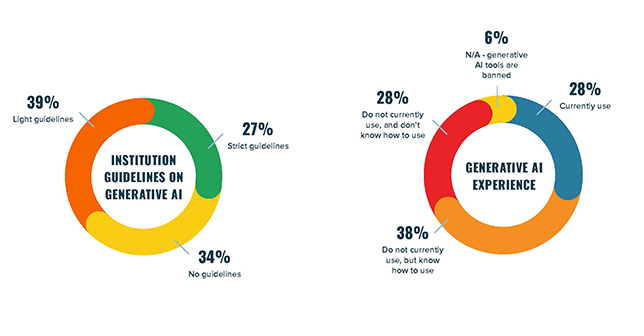To keep up with growing demand for its "flex" degree partnership model, 2U, owner of the edX learning platform, has signed agreements with six universities to offer 50 new degree programs, to follow other degree contracts set to begin in 2024.
Anthology plans to expand its AI Design Assistant suite of learning tools in Blackboard Learn Ultra to include an AI-powered authentic assessment generator to make it easier for educators to determine student learning mastery, the company said. The new tool will be released in December 2023.
PowerNotes has introduced PowerNotes+, a new reading, research, and writing platform for higher and K–12 institutions, educators, and students that offers AI tools and features. With these new tools, educators can view their students' research and writing process from start to finish and help them use AI with transparency and integrity, the company said.
Learning platform edX and Jobs for the Future (JFF), with funding from the Charles Koch Foundation, have announced the no-cost edX MicroBachelors Program Pathway Initiative for adults who wish to earn a bachelor's degree through the MicroBachelors program.
Sparked by the need for remote learning solutions in the face of the pandemic, The College of New Jersey (TCNJ) in 2020 began installing ClearOne audio systems in small and large classrooms and conference rooms campuswide.

How will artificial intelligence, next-generation virtual classrooms, and other emerging technologies impact the future of higher education? A new research project from The Campus Computing Project founder Casey Green will examine "the potential for these technologies to significantly transform teaching, learning, and instruction in academic and instructional environments," according to an announcement released at the Educause Annual Conference.

Skills-based learning in higher education and a clearer path to a career are the top priorities for students and educators this year, according to the 2023 State of Student Success and Engagement in Higher Education survey results released today by Instructure, the maker of Canvas LMS.
Zoom has globally launched its new Zoom One for Education plan, offering a unified communications and collaboration licensing option designed specifically for education organizations, according to a news release.
Rice University's OpenStax initiative has welcomed the largest cohort of colleges and universities to its Institutional Partner Program (IPP) since its founding in 2015. Sixteen new institutions have joined the program to give their students free or low-cost access to textbooks and other educational materials.
Southwest Texas Junior College, a community college serving a large 11-county area, announced it has partnered with instructional design firm iDesign to create new online courses and certificates in STEM, the humanities, social sciences, and more.